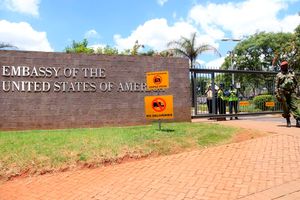
When we choose kindness, we enable others to do the same.
Kindness. Kindness and loyalty. This is a story of how acts of kindness and loyalty on matters politics can shape destiny in hidden ways.
The Bible talks of Rahab, a Canaanite prostitute, who hides two Israelite spies in Jericho and helps them escape. Her act preserves the intelligence mission, leading to the fall of Jericho. She is spared in the invasion — and becomes part of the lineage of Jesus. Rahab had no reason to side with Israelites but she decided otherwise and harvested later.
Ruth was a Moabite widow, who refused to abandon her mother-in-law, Naomi, despite the death of her husband, Naomi's son. Ruth was childless and with her husband dead, the most convenient thing would have been to go back to her own people and get a new husband. But she sticks with her mother-in-law. She says "your people shall be my people." She then meets Boaz, becomes his wife and is grafted into the lineage of King David — and Christ. Loyalty during personal tragedy changes world history.
What about the widow of Zarephath sharing her last meal? The Bible records that during a famine, this poor widow gives her last flour and oil to Elijah. Her household is miraculously sustained, and her act plays a role in preserving Elijah’s ministry. Scarcity did not stop her generosity — it sustained a prophet.
Such stories do mirror political acts. The best example is the case of Tom Mboya Airlifts. Tom Mboya, then aged only 28 years, started in 1959 a programme to help bright Kenyan students acquire education in Canada and the United States. He mobilised a number of Americans to support it, including Senator John F. Kennedy (who later became the youngest US president). Amongst the people Mboya is said to have assisted during that period included Barack Obama Senior. This Obama went on to father the first black American President.
This brings us to the story of John and Frank. These two gentlemen are age mates born in the same village. John did not have a sister or brother hence dotted by his parents as an only child. Frank and John attend the same primary school from Standard One to Eight. Frank proceeds to high school and later on to university. For John, unfortunately, books were not his thing. He does not join secondary school. He dives straight into hustling at the tender age of 15 as a mechanic.
Early marriage
He marries early at the age of 16 or 17. His girlfriend, Susan, drops out of Form 2 to get married. Susan would have definitely gone places academically as she was at the best girls’ school in the county - were it not for the early marriage. John and Frank lead separate lives. John is a mechanic cum owner of "breakdown " in the capital city (an oldish towing Land-Rover) and Frank is a university politician.
But political fate re-unites them at the age of 21 after Frank is suspended from college. Frank returns to the village and decides to seek the position of Member of the County Assembly post. He simply plays the Gen Z card and common man politics against political dynasties. John returns to the village to join the struggle. Both are poor youths with no campaign funds facing rich-money dynasties. But John brings a crucial asset: the beaten 'breakdo'wn'. It epitomises struggle and hence the hoi polloi rally behind the duo. The duo win in a landslide. But unlike other political campaigners who demand payback, John disappears back to the capital city and asks for nothing. No strings attached.
Unfortunately, John gets an accident and dies almost immediately after the elections. He leaves behind his young widow and three very young children: two girls and one boy.
The young widow afterwards leaves John's family but the children stay behind with the grandparents. She visits them regularly but, unfortunately, she dies a short period after her husband. The elderly grandparents struggle to raise them but they are the brightest in school. Frank, in the meantime, ascends to a higher post and supports the children through bursaries. They all go to national schools and make it to the university.
But tragedy strikes and both grandparents die due to old age. Frank in the meantime, rejoins campus, leaves politics and establishes a professional business. He hires John's firstborn as a clerk before she commences university. She joins the university and works during holidays at Frank’s office. John's second born joins university to study business but she is helped by Frank to switch to another course. She has finished this year.
Employment letter
John’s first born finished last year and returned to do clerical work at Frank's office. But that is not her career.
So, Frank talks to his friend, a director of a major organisation. The director has helped many friends of Frank get employment but he is retiring. If he retires, Frank has no way of helping late John's firstborn daughter.
And there is some registration that needs to be done in record time to qualify for the opportunity. Somehow it happens in the nick of time. Fortunately, on the very last day of director's retirement, he hands over his last help to Frank: employment letter for John's first-born daughter.
This now opens the way for John's second daughter to join Frank. It's easier now, the second daughter’s profession rhymes with Frank's line of work.
The moral of the above story is that we need to be kind to people without expecting any reward. You never know — there are many rewards into the future.
John did an act of kindness and expected no rewards. Though he passed on, the seed he planted has germinated. Let us be like good Samaritans. It pays in hidden ways.
Dr Irungu Kangata is the Governor of Murang’a County. Email [email protected]










